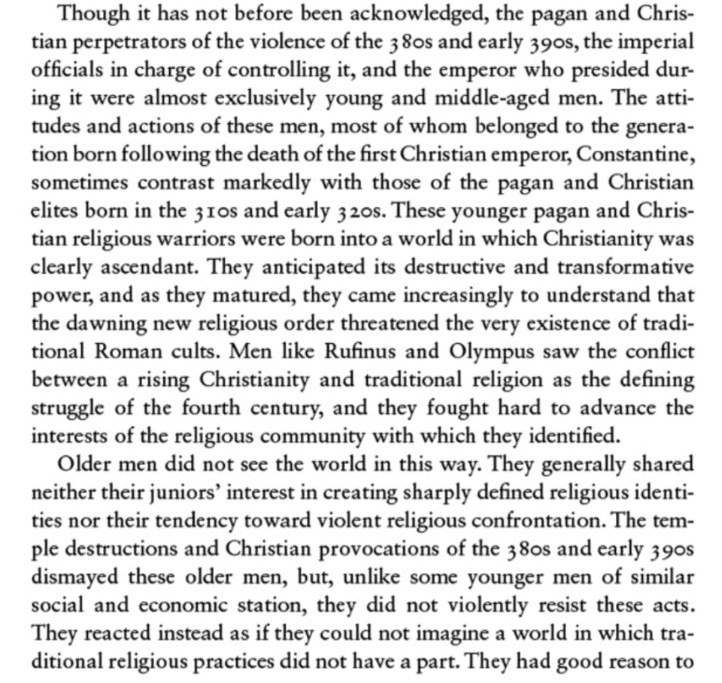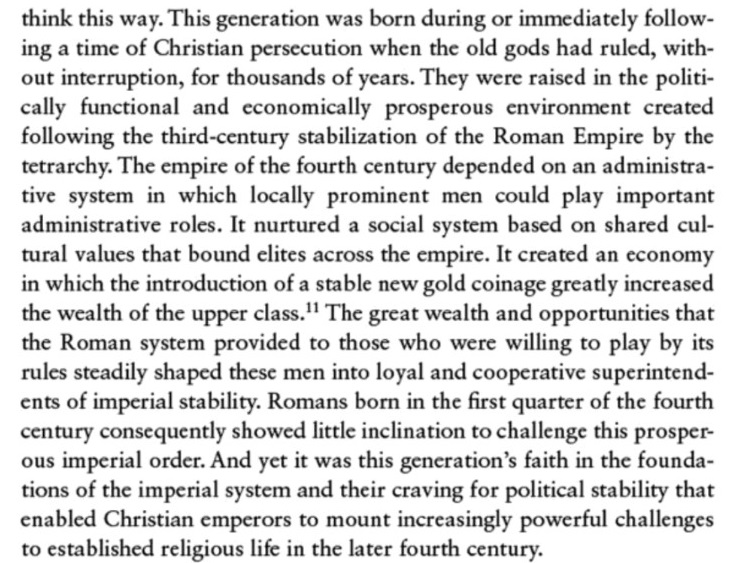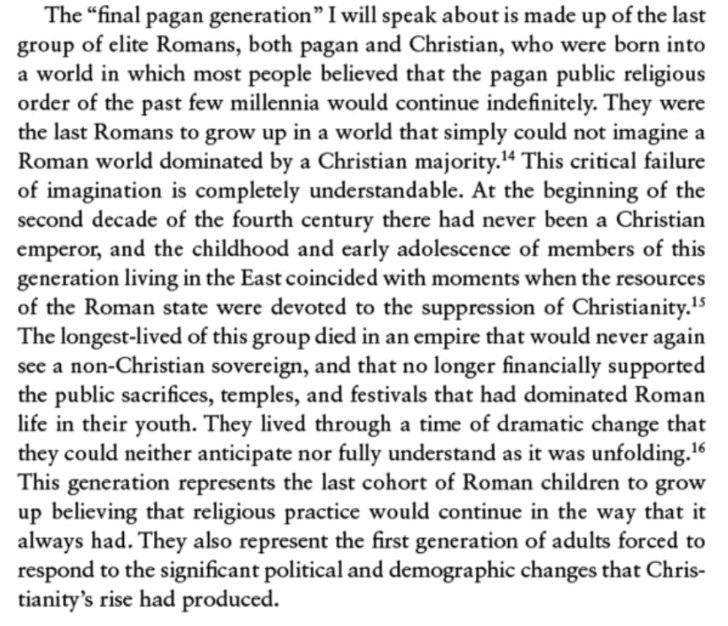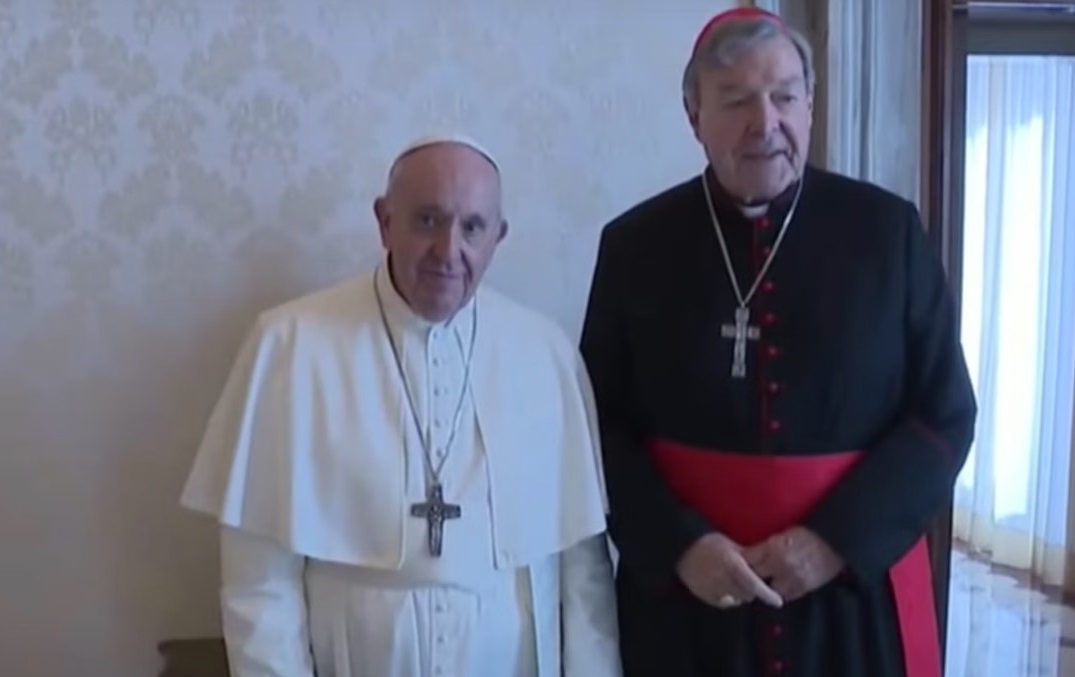VATICAN CITY (VATICAN CITY)
The American Conservative [Washington DC]
January 14, 2023
By Rod Dreher
Sometimes it is wise to keep calm and carry on in the face of church problems. For Rome, this is not one of those moments
That above is Pope Francis meeting with Cardinal George Pell, who died this week. Both men’s names were much talked about at the table last night with three young American Catholics in Budapest for a fun weekend together. The guys are all theological conservatives, well educated and well informed about things going on in their church. Naturally they’re concerned about the situation today. We got to talking about the bombshell “Demos” memo authored secretly by Cardinal Pell, who described the Francis papacy as a “catastrophe.” In the memo, Pell called on the cardinals heading into the eventual conclave that will replace Francis to choose someone who will address several grave problems in the Roman Curia and papacy.
One of the guys at the table las night has Italian ancestry. He told us that his relatives in Rome are sanguine about the whole thing. Their attitude is basically: This city has seen the Church’s fortunes rise and fall over two millennia. It has seen holy popes, wicked popes, mediocre popes, the lot. We aren’t going to get too worked up over the corruption today. This too shall pass.
Sometimes that kind of approach is wise, even courageous. But, as I told my new friends last night, I think it is really dangerous right now, for the Catholic Church. Leaving aside that unaddressed corruption may result in the loss of souls, it is also very risky for the Church itself, in a way that it wouldn’t have been in almost any previous era. Why? I told them the story in Edward J. Watts’s great book The Final Pagan Generation, which is about the transformation of the Roman Empire in the fourth century. Essentially, Watts explains that the pagan elites honestly didn’t see that Christianity was overturning paganism. For them, yes, the Christians were an upstart sect, but no real threat to Rome’s ancestral religion. Rome had been pagan for many centuries, and always would be. Aren’t the temples still open, despite the Christians? People need to calm down about Christianity. This too shall pass.
Well.
We had been talking too about the belief by a certain number of thinkers on the Catholic Right that the way to fix things is to achieve and exercise political power. I brought up the case of Julian the Apostate, who used his time as Caesar in the mid-fourth century to attempt to reverse the growth of Christianity. He died after only two years on the imperial throne, but it is highly doubtful that he could have succeeded in any case. The cultural currents carrying Rome towards the new religion were simply too deep, too wide, and too strong. This doesn’t mean that we shouldn’t try to achieve political power and use it for the good. What it means is that political power is not enough if the hearts and minds of the people haven’t been converted.
One of the Catholic men brought up the case of Gen. Franco in Spain. He was a strong Catholic who, after his forces defeated the Left in the Spanish Civil War, established a strongman state that gave Catholicism center stage. But after Franco died, Catholicism suffered a huge collapse. The reasons for this were varied, but the point to take away is that the exercise of political power alone not only can’t save a religion, but it might even work against the religion taking hold in the hearts of the people. I know Russian Orthodox believers living in Moscow who struggle with their faith because the Church’s senior leadership are so close to the State. And look at Ireland, where the Catholic faith is flat on its back. One reason for this is the revelations of how the State deferred to the Church in covering up clerical sex abuse. Again, there are a number of reasons for Catholicism’s failure in Ireland, and anyway, Ireland has been a democracy for a long time, not an autocracy like Franco’s Spain or Putin’s Russia. Still, the very close collaboration of Church and State ended up hurting the Church regarding the abuse scandal — and, of course, the State, which never, ever should have protected the Church from itself.
I wish I could find the source of the quote I once read from Hungarian PM Viktor Orban, who was asked about his belief that Hungary should be unapologetically Christian (or Judeo-Christian, as his government supports Jewish institutions too). Orban responded that there were limits in what any politician can do to strengthen the faith. He said something along the lines of, “As a politician, I can give you things. I can’t give you meaning.” His point is that the State can help create the conditions in which religion can thrive, but the health and strength of the faith itself depends on religious institutions and the people that lead them.
I wish I had brought up historian Barbara Tuchman’s book The March Of Folly, specifically the chapter on how the folly of six Renaissance popes led to the Reformation. In it, she sums up her case:
Their three outstanding attitudes — obliviousness to the growing disaffection of constituents, primacy of self-aggrandizement, illusion of invulnerable status — are persistent aspects of folly. While in the case of the Renaissance popes, these were bred in and exaggerated by the surrounding culture, all are independent of time and recurrent in governorship.
What those Renaissance popes also had to deal with was the advent of a new technology, printing, that allowed ideas to spread much faster than they had before, and made it very difficult to control their advance. They had been formed by a pre-print world. Similarly, the senior officials in the Roman Curia today, including the Pope, was formed by a pre-Internet world. The primary reason the abuse scandal shook the Catholic Church in the early part of this decade, and not before, was the Internet. A legal case in Boston of clerical sex abuse and cover-up (the 2002 John Geoghan trial) would not likely have led to a nationwide reckoning, because Catholics all across America would only have learned about it by reading their newspapers or watching it on TV. They would have received the information as a Boston story. But the Internet changed everything. It made up to date information about the Boston case widely available around the world, at the same time it was available in Boston. It also allowed ordinary Catholics to comment for a potentially worldwide audience on their anger and frustration with the way their bishops handled these grave matters. Information that had to pass gatekeepers to make it to the public in ages past was now instantly and widely available. That changed everything.
I remember being home in Louisiana visiting my folks, in 2004, when it broke that a previous Catholic bishop of Baton Rouge, the very conservative Joseph Sullivan, had been a sex abuser in the 1970s. I went to mass that weekend, and heard a priest read from the pulpit a statement by the then-bishop, acknowledging Bishop Sullivan’s crimes. When the priest substituting for the parish’s pastor that weekend finished reading the bishop’s statement, he instructed the congregation not to talk about what Bishop Sullivan did. I was furious! But later, I had to laugh at the stupidity of that priest, thinking that the laity would obey his order not to talk about the fact that one of their prior bishops had sexually abused a male minor. That might have worked in a past age, but today, it’s like King Canute ordering the incoming tide to reverse course.
In looking for that Tuchman quote just now, I came across an old post from my Beliefnet days, which may well apply here. I copied it here, but had to take the link to Shirky’s post down, because it has gone dead:
In a post about the future of media business models, Clay Shirky offers the following rumination on an archaeological book by Joseph Tainter, “The Collapse of Complex Societies.” He says Tainter’s thesis is that complex societies of the past collapsed not in spite of being sophisticated, but because they were so sophisticated they couldn’t adapt to changed conditions. Here’s Shirky:
Tainter’s thesis is that when society’s elite members add one layer of bureaucracy or demand one tribute too many, they end up extracting all the value from their environment it is possible to extract and then some.
The ‘and them some’ is what causes the trouble. Complex societies collapse because, when some stress comes, those societies have become too inflexible to respond. In retrospect, this can seem mystifying. Why didn’t these societies just re-tool in less complex ways? The answer Tainter gives is the simplest one: When societies fail to respond to reduced circumstances through orderly downsizing, it isn’t because they don’t want to, it’s because they can’t.
In such systems, there is no way to make things a little bit simpler – the whole edifice becomes a huge, interlocking system not readily amenable to change. Tainter doesn’t regard the sudden decoherence of these societies as either a tragedy or a mistake–“[U]nder a situation of declining marginal returns collapse may be the most appropriate response”, to use his pitiless phrase. Furthermore, even when moderate adjustments could be made, they tend to be resisted, because any simplification discomfits elites.
When the value of complexity turns negative, a society plagued by an inability to react remains as complex as ever, right up to the moment where it becomes suddenly and dramatically simpler, which is to say right up to the moment of collapse. Collapse is simply the last remaining method of simplification.
I read somewhere, ages ago, that a good definition of institutional corruption is when the leadership class of the institution understands that it has to change to save itself, but is unable to do so. Can the Roman Curia be said to be corrupt in that precise way? I don’t know. But it’s worth considering.
I wrote this post as a response to what my new friend said about his Roman relatives and the way they think about crisis and corruption in the Vatican. There is deep wisdom in their approach, one that excitable declinists like me should pay attention to. On the other hand, that was the stance the Roman elites of the fourth century took towards the Empire’s paganism. It did not turn out well for them.
I’ll end by quoting from the introduction to Watts’s book. My copy is on the other side of the Atlantic, so I’ve had to go to the “Look Inside” feature of Amazon. The key thing to note is that by the end of the fourth century, it was the young men, both pagan and Christian, who grasped what was happening. The older men, both pagan and Christian, did not. Today, the Vatican is governed by old men who do not know what time it is, and who persist in the self-destructive folly that Cardinal Pell called out, and that Barbara Tuchman documented in her study of why ecclesial corruption left unaddressed by a series of popes led to the Reformation:


More:

Rod Dreher is a senior editor at The American Conservative. A veteran of three decades of magazine and newspaper journalism, he has also written three New York Times bestsellers—Live Not By Lies, The Benedict Option, and The Little Way of Ruthie Leming—as well as Crunchy Cons and How Dante Can Save Your Life. Dreher lives in Baton Rouge, La. Articles by Rod

